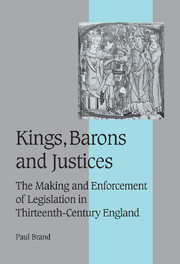Book contents
- Frontmatter
- Contents
- List of tables
- Preface
- List of abbreviations
- INTRODUCTION
- Part I Politics and the legislative reform of the common law: from the Provisions of Westminster of 1259 to the Statute of Marlborough of 1267
- Part II Beyond politics: the enforcement and interpretation of the Statute of Marlborough in the courts, 1267–1307
- Chapter 8 CONTRA FORMAM FEOFFAMENTI: THE STATUTORY ACTION FOR TENANTS CONTESTING LIABILITY TO SUIT OF COURT AFTER 1267
- Chapter 9 OTHER MECHANISMS FOR THE ENFORCEMENT OF CHAPTER 9; OTHER REFORMS AFFECTING THE LORD–TENANT RELATIONSHIP
- Chapter 10 REFORMS IN THE CRIMINAL JUSTICE SYSTEM
- Chapter 11 REFORMS IN THE PROCEDURES OF THE ROYAL COURTS
- Chapter 12 THE EXTENSION OF EXISTING REMEDIES
- Chapter 13 ENFORCING THE ACCOUNTABILITY OF SOCAGE GUARDIANS
- Chapter 14 CONTROLLING THE USE OF DISTRAINT
- Chapter 15 REMEDYING ABUSES IN THE OPERATION OF LOCAL COURTS
- Chapter 16 CONCLUSIONS
- Appendix I TEXT AND TRANSLATION OF THE PROVISIONS OF WESTMINSTER OF 1259
- Appendix II TEXT AND TRANSLATION OF THE PROVISIONS OF WESTMINSTER AS REISSUED IN 1263 AND 1264
- Appendix III TEXT AND TRANSLATION OF THE STATUTE OF MARLBOROUGH OF 1267
- Bibliography
- Index
- Cambridge Studies in Medieval Life and Thought Fourth series
Chapter 15 - REMEDYING ABUSES IN THE OPERATION OF LOCAL COURTS
Published online by Cambridge University Press: 16 June 2009
- Frontmatter
- Contents
- List of tables
- Preface
- List of abbreviations
- INTRODUCTION
- Part I Politics and the legislative reform of the common law: from the Provisions of Westminster of 1259 to the Statute of Marlborough of 1267
- Part II Beyond politics: the enforcement and interpretation of the Statute of Marlborough in the courts, 1267–1307
- Chapter 8 CONTRA FORMAM FEOFFAMENTI: THE STATUTORY ACTION FOR TENANTS CONTESTING LIABILITY TO SUIT OF COURT AFTER 1267
- Chapter 9 OTHER MECHANISMS FOR THE ENFORCEMENT OF CHAPTER 9; OTHER REFORMS AFFECTING THE LORD–TENANT RELATIONSHIP
- Chapter 10 REFORMS IN THE CRIMINAL JUSTICE SYSTEM
- Chapter 11 REFORMS IN THE PROCEDURES OF THE ROYAL COURTS
- Chapter 12 THE EXTENSION OF EXISTING REMEDIES
- Chapter 13 ENFORCING THE ACCOUNTABILITY OF SOCAGE GUARDIANS
- Chapter 14 CONTROLLING THE USE OF DISTRAINT
- Chapter 15 REMEDYING ABUSES IN THE OPERATION OF LOCAL COURTS
- Chapter 16 CONCLUSIONS
- Appendix I TEXT AND TRANSLATION OF THE PROVISIONS OF WESTMINSTER OF 1259
- Appendix II TEXT AND TRANSLATION OF THE PROVISIONS OF WESTMINSTER AS REISSUED IN 1263 AND 1264
- Appendix III TEXT AND TRANSLATION OF THE STATUTE OF MARLBOROUGH OF 1267
- Bibliography
- Index
- Cambridge Studies in Medieval Life and Thought Fourth series
Summary
As has been seen, the longest and most detailed part of the Statute of Marlborough was the chapter dealing with the use of distraint in securing the performance of suit to seignorial courts. This had also been true of the earlier Provisions of Westminster of 1259. Other chapters, too, were concerned with abuses connected with the workings of local, non-royal courts: attempts to enforce attendance at the sheriff's tourn (and at the view of frankpledge) from those who should have been exempt from this; attempts to enforce payment of beaupleder fines from those with a duty to present offences at such sessions; the use of distraint to secure the appearance of defendants to answer in local courts who were not subject to the jurisdiction of those particular courts. There were also a number of other chapters concerned with remedying other perceived abuses in the operation of local courts. These covered sheriffs allowing the release of those convicted of redisseisin in the county court without specific authorisation from the king and payment of the necessary fine (chapter 8); lords hearing pleas of false judgment in their courts (chapter 19); lords and sheriffs compelling those essoined in local courts to warrant their essoins on oath (chapter 20); the failure of sheriffs to secure the release of the animals taken in distraint that were held in franchises after a plaint had been made to them about this (chapter 21); lords forcing their free tenants to answer for their free tenements in their courts without prior authorisation by a royal writ or putting them on oath (as jurors) in their courts against their will without prior royal authorisation (chapter 23).
- Type
- Chapter
- Information
- Kings, Barons and JusticesThe Making and Enforcement of Legislation in Thirteenth-Century England, pp. 378 - 387Publisher: Cambridge University PressPrint publication year: 2003

